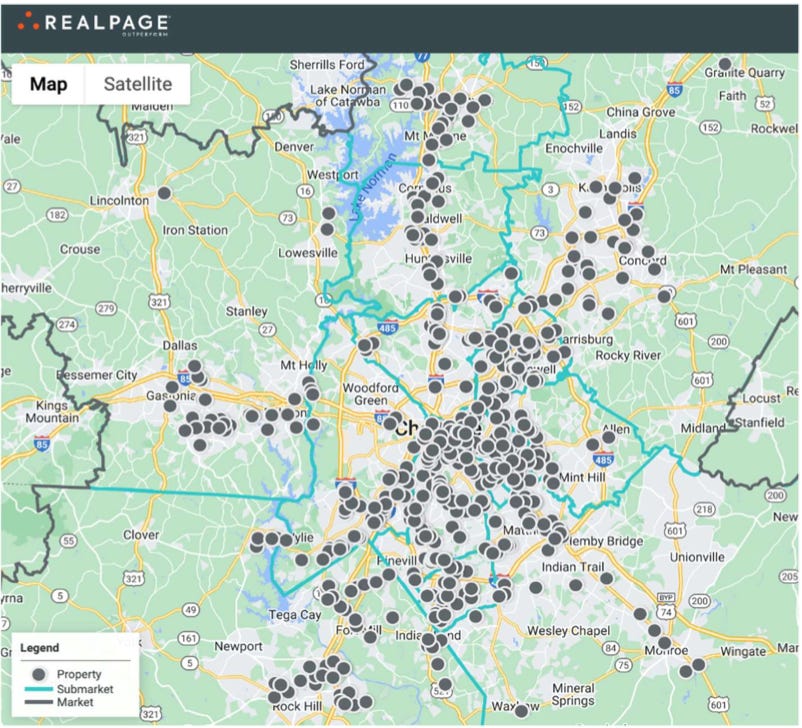Justice Department lawsuit targets Charlotte apartment rents
Plus: First day of school for CMS (brace for Facebook photos); Reader question on Johnson C. Smith fundraising; Airport to extend Concourse A even more; City leaders eye DNC in '28; Gas bills to rise
Good morning! Today is Monday, August 26, 2024. You’re reading The Charlotte Ledger, an e-newsletter with local business-y news and insights for Charlotte, N.C.
Need to subscribe — or upgrade your Ledger e-newsletter subscription? Details here.
Federal government alleges software company algorithms led to collusion to inflate rents; Charlotte a top 10 market
by Tony Mecia
A company that helps a large portion of Charlotte-area apartment complexes set their rents is the subject of a new federal antitrust lawsuit alleging that apartment managers used the firm’s high-tech software to keep rents high.
On Friday, the U.S. Justice Department filed a lawsuit against software company RealPage, alleging it engages in price-fixing by collecting data from apartment managers and using sophisticated algorithms to recommend rental rates.
The suit identifies Charlotte as one of the 10 metro areas with the highest share of RealPage customers. It does not accuse apartment operators of wrongdoing or name any of them. But previous lawsuits have identified large national real estate companies with a significant Charlotte presence as some of the users of the software, including Greystar, MAA, Camden, Bell Partners, AvalonBay, Highmark Residential and Lincoln Property Co.
It is a novel twist in the age of artificial intelligence, in which the allegation is not price-fixing in the classic sense, in which apartment owners meet to collude on prices. Rather, it is that they shared their rental information with the RealPage software, which made recommendations to inflate apartment rents.
“By feeding sensitive data into a sophisticated algorithm powered by artificial intelligence, RealPage has found a modern way to violate a century-old law through systematic coordination of rental housing prices,” a Justice Department official said in a news release.
Friday’s suit by the Justice Department follows a string of private federal lawsuits. As The Ledger’s Charlotte Commercial Real Estate Whispers column reported in June:
It’s a national issue, but there is a Charlotte tie-in. A class-action federal lawsuit [in Tennessee] mentions Charlotte as one of the markets where RealPage is dominant, with Charlotte-area property managers who use revenue management software accounting for 76% of the region’s apartments.
The federal suit, filed in August 2023, says that Charlotte rents have risen 56% since 2016. (Inconveniently for the court case, rents have been dropping for the last year or so, as a glut of new apartments has hit the market.) …
The lawsuit also says: “Two active trade associations — the Greater Charlotte Apartment Association and the Apartment Association of North Carolina — serve as conduits of the cartel, by providing venues for RealPage and participating Charlotte Submarket Lessors to further their cartel’s goals.”
RealPage and its allies have denied the allegations of anticompetitive practices and said the software is legal “pro-competitive technology” that helps individual properties maximize revenue.
It has said that its software “makes price recommendations in all directions — up, down, or no change — to align with property-specific objectives of the housing providers using the software,” and it said some of the lawsuits had exaggerated its market share.
Documents filed in a federal court case in Tennessee allege that the Charlotte market widely uses RealPage to help it set apartment prices in violation of price-fixing laws. The dots represent apartment complexes that plaintiffs say use RealPage software.
The Ledger reported in July that rents in the Charlotte region have fallen in the last year, following several years of big increases. For instance, rents were down 3.5% in uptown and 2% in South End between the second quarters of 2023 and 2024. The Charlotte Observer reported in July that rents in Charlotte dropped the sixth most of any city in the country in the previous year.
The Justice Department suit identifies the Charlotte region as one of 10 metro areas in which RealPage has the highest concentrations of customers, with between 29% and 38% market penetration. The list also includes Raleigh, Durham-Chapel Hill and Charleston, S.C.
The suit was filed in the Middle District of North Carolina, which is headquartered in Greensboro. It was joined by N.C. Attorney General Josh Stein, a Democrat who is running for governor.
Related Ledger articles:
“FBI price-fixing raid on apartment manager in Atlanta has Charlotte implications” (Charlotte Commercial Real Estate Whispers, June 17)
“Apartment rents keep on falling, all over” (July 26)
Want more details?
Read a thorough analysis of the issue from the Substack newsletter
.
Today’s supporting sponsor is Landon A. Dunn, attorney-at-law in Matthews:
Today is go-time for CMS and its 141,000+ students
START THE BUS: More than 141,000 Charlotte-Mecklenburg Schools students head into the classroom today for the start of the 2024-25 school year. CMS has a few new school buildings opening today: the new Knights View Elementary and Ballantyne Ridge High School in south Charlotte as well as a replacement building for Bruns Avenue Elementary in west Charlotte. CMS still needed 293 teachers as of last week as well as 38 bus drivers – lower vacancy numbers than the district had at the same time last year. (Ledger file photo by Kevin Young/The 5 and 2 Project)
You Ask, We Answer: Why is Johnson C. Smith University raising money for financial aid if it is getting $80M in new donations?
Welcome to the latest installment of “You Ask, We Answer,” the occasional Charlotte Ledger feature in which we deploy our reporting resources to make our smart and informed readers even smarter and better-informed.
We field questions — ones that can’t be answered through Google or ChatGPT — and get to work researching and then sharing the knowledge we gain.
Today’s question comes from Ledger reader Matthew:
Johnson C. Smith just got $80 million from the Mayor’s Racial Equity Initiative. Why are they having to scramble for financial aid?
Thanks for the question!
This appears to be in reference to a spate of articles in Charlotte media last week that reported that Johnson C. Smith University (JCSU) was launching a 10-day “emergency aid campaign” to raise $250,000, which would be used to offer financial aid to needy students. The school has said it has a surge of new students this year, and that as of last week, 300 students were in jeopardy of not being allowed to register for classes for financial reasons.
A note on the school’s website says: “We need to raise at least $250,000 to get our students the financial relief they need to register and clear.”
Our reader points out, though, that Johnson C. Smith was also one of the major recipients of money from the Mayor’s Racial Equity Initiative, an effort announced in 2021 to commit $250M from public and private sources to improve racial equity and economic opportunity. The plan was to earmark $80M of the money to Johnson C. Smith, including a $40M pledge from the Duke Endowment.
The most recent public update from the Mayor’s Racial Equity Initiative, from mid-2023, shows that the school had received about $5M. At the time, the initiative was just a few million dollars shy of the $250M it hoped to raise. It surpassed its $150M goal for private-sector fundraising at the end of 2022 but as of a year ago had not apparently distributed the bulk of the money.
At JCSU, the plan was to hire more deans, faculty and leaders to transform the campus, expand student services, upgrade the curriculum and increase enrollment. The Duke Endowment’s web page shows that it has made more than $23M in grants to JSCU since 2021 for a variety of purposes.
The Ledger asked the PR person affiliated with the Mayor’s Racial Equity Initiative for an update on JCSU, and she referred questions to JCSU.
Asked about the money from the Mayor’s Racial Equity Initiative in light of this month’s $250,000 fundraising campaign for financial aid, vice president of student affairs Davida Haywood replied in an email:
You will recall that the funding received from MREI was given to support a cadre of academic, student-focused and transformational initiatives on campus. Some of the funds were indeed scholarship-related, but were also specific to particular academic majors/programs and student retention.
The campaign that we have recently launched is no different than other institutions that do a giving push, right before school starts, to help students “close the gap.” And, we take a number of items into consideration (i.e., FAFSA completion and awarded aid). Our Offices of Financial Aid, Student Accounts and Institutional Advancement do a great job of working together to assess each student and their financial needs—before gap funding is rendered.
Asked by email specifically how the money was used, she did not reply.
The university’s publicly available tax forms show that it reported $62M in revenue in the 12 months ending in June 2023 and $59M in expenses. In the prior year — the one ending in June 2022 — its revenue spiked to about $111M (with $54M in expenses) because of unusually robust contributions. It is unclear if those were connected to the Mayor’s Racial Equity Initiative.
Bottom line: The publicly available information on the finances seems a little muddied, but the answer appears to be that money from the Mayor’s Racial Equity Initiative went to other uses at Johnson C. Smith, many to achieving long-term strategic goals, not financial aid. And in any event, the university might not have received that full $80M pledge just yet.
JCSU’s president is holding a public Zoom meeting tonight at 6 p.m. to discuss the need to raise money for financial aid. —TM
How far can it go? Airport to extend Concourse A even further
Who’s ready for more airport construction?
The Charlotte City Council is expected to approve a contract tonight for the design of yet another expansion of Concourse A.
The project, called the “Concourse A Expansion Phase 3,” would add 150,000 s.f. and seven gates. It would continue the march of Concourse A back toward the Long Term 1 parking lot and Wilkinson Boulevard and would connect to the (appropriately named) “Concourse A Expansion Phase 2.” That’s scheduled to add 10 gates (mostly for Delta Air Lines) and open this fall.
The red arrow shows the site of the future Concourse A Expansion Phase 3 project. It will connect to the Concourse A Expansion Phase 2 project, which connects to the Concourse A Expansion Phase 1 project, which connects to the original Concourse A. Got it? (Photo from city documents; Ledger added the red arrow)
Construction on Phase 3 is likely years away, though. And like Phase 2, it shouldn’t disrupt airport operations because it is in an area that doesn’t already have passengers. Unlike, say, the ongoing terminal lobby renovation and expansion.
The airport is proposing to award the contract to architecture and engineering firm Gresham Smith. It is expected to be worth about $22M. —TM
➡️ Read more: The Charlotte Observer is out with a list this morning of recent previously reported airport projects.
Related Ledger articles:
“A miserable summer for air travel” (🔒, July 24)
“CLT is bustling — but slips in ranking of international airports” (June 5)
“The future of Charlotte’s airport” (article and podcast, Aug. 17, 2023)
You might be interested in these Charlotte events
Events submitted by readers to The Ledger’s events board:
SEPT. 6: Pickleball for Camp Fundraiser, 5-9 p.m., Pickleball Charlotte, 8401 Sharon Lakes Road. Join Camp Blue Skies & Pickleball Charlotte at a new location (indoors), time (Friday evening) & format (Frenzy) for the annual fundraiser to support our camps for adults with developmental disabilities! Don’t play? Join us for the social & raffle! Players: $75; Social: $25.
SEPT. 14: Lowcountry Culture Festival, 1-6 p.m., Ballantyne’s Backyard, 11611 N. Community House Road. QCity Metro’s Lowcountry Culture Festival is a dynamic celebration that will feature a fusion of Lowcountry cuisine, soulful music, vibrant art, and the craftsmanship of local makers. Attendees can try she-crab soup, watch the live art of basket weaving, enjoy Southern cocktails, learn the history of the Lowcountry and more. $75.
➡️ List your event on the Ledger events board.
In brief:
Charlotte leaders eye DNC in 2028: Charlotte leaders are interested in having the city host the 2028 Democratic National Convention. Charlotte Regional Visitors Authority CEO Steve Bagwell told the Charlotte Business Journal: “While discussions about hosting the DNC in 2028 are still in the early stages, we are eager to collaborate with the city of Charlotte to formally express our interest to the Democratic National Committee and pursue a request for proposal.” Greater Charlotte Hospitality & Tourism Alliance CEO Mohammad Jenatian “began prodding” City Council members and the visitors authority to consider a bid, the publication said.
Covid shutdown lawsuit can continue: The N.C. Supreme Court is allowing a Covid-era lawsuit against state health officials to continue, in which Ace Speedway in Alamance County is seeking financial damages stemming from orders to stop holding events in defiance of crowd-size limits. The speedway says it was a victim of “unlawful selective enforcement” in May 2020 for speaking out against the ban on public gatherings ordered by Gov. Roy Cooper and former health secretary Mandy Cohen. (Associated Press)
Mayor, commissioner urge support for transit plan: In a column published in The Charlotte Observer, Charlotte Mayor Vi Lyles and county commissioner Leigh Altman urge residents to support the effort to have the General Assembly approve legislation allowing for a sales tax referendum that would pay for transit and roads. “We have to successfully achieve the legislation at this moment in time to even have the choice,” they write. (Observer; read background on the plan in last week’s Transit Time newsletter)
Gas rate increase planned: Piedmont Natural Gas is proposing to raise rates for residential customers by an average of about 15% a year beginning in January 2025. The money would help pay for operations and maintenance of gas transmission lines. (WFAE)
Hopewell principal suspended: The principal of Hopewell High School in Charlotte has been suspended with pay. The school district did not offer an explanation, citing personnel privacy laws. (WCNC)
Shore access exemption sought: Builder Mattamy Homes is seeking an exemption to a Mooresville ordinance that requires public access to Lake Norman so that it can build 87 single-family homes. (Observer)
Banana pudding milkshake returns: Chick-fil-A’s best milkshake flavor, banana pudding, returns to menus today for the first time in 13 years. (Chick-fil-A)
Loves me some internet: Celebration time
A post from Reddit user “Randyyyyyyyyyyyyyy” on the site’s discussion group about the Carolina Panthers, following the team’s 31-26 preseason victory over the Buffalo Bills on Saturday — its first of the preseason after going 2-15 last year:
Need to sign up for this e-newsletter? We offer a free version, as well as paid memberships for full access to all 4 of our local newsletters:
➡️ Opt in or out of different newsletters on your “My Account” page.
➡️ Learn more about The Charlotte Ledger
The Charlotte Ledger is a locally owned media company that delivers smart and essential news through e-newsletters and on a website. We strive for fairness and accuracy and will correct all known errors. The content reflects the independent editorial judgment of The Charlotte Ledger. Any advertising, paid marketing, or sponsored content will be clearly labeled.
Like what we are doing? Feel free to forward this along and to tell a friend.
Sponsorship information/customer service: email support@cltledger.com.
Executive editor: Tony Mecia; Managing editor: Cristina Bolling; Staff writer: Lindsey Banks; Business manager: Brie Chrisman







